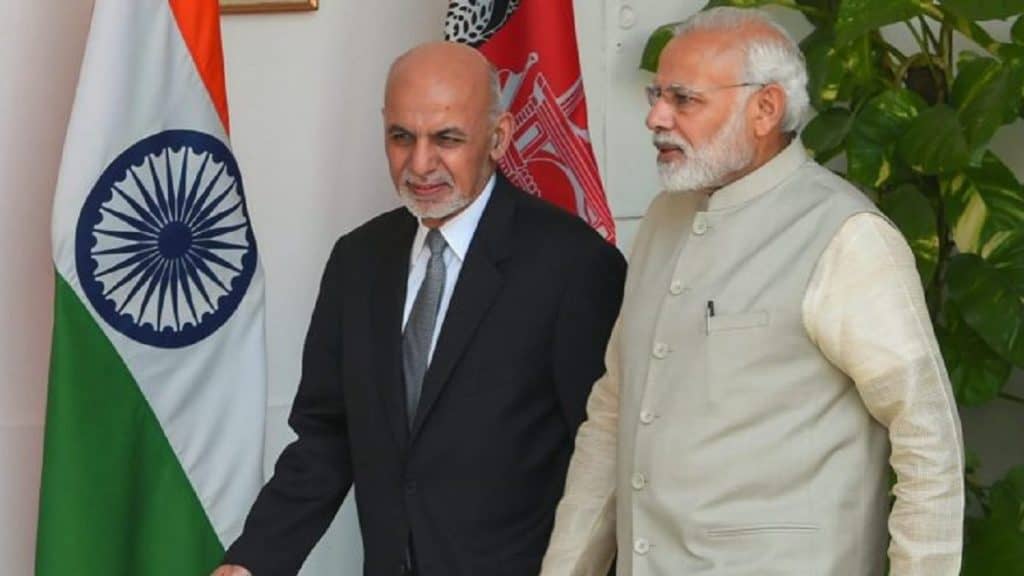By Dr. Rajkumar Singh (Professor and Head Department of Political Science Bhupendra Narayan Mandal University)
In recent decades and years India has tremendously increased its influence in Afghanistan, that’s why Pakistan has supported every government in Afghanistan.

Every Islamabad policy for Kabul has been made on the bases that there must be no representative of pakhtoons in Kabul government, on the view that if pakhtoons got roots in Afghanistan they would create great trouble for Pakistan. So Pakistan always supported anti Pakhtoons governments, trying to install anti Pakhtoons regime there and to put its benevolent politicians in the Afghan cabinets.
India has encouraged greater Baluchistan and other separatist movements, for encircling Pakistan and creating instability and disturbance. This is the reason India and Pakistan are trying to increase their influence in Afghanistan, installing their people there.
Intermingling of Pak- Afghan problems
Pakistan is facing a lot of internal and domestic security concerns. A lot of militant groups has been working against Pakistan. More than 50,000 lives have been lost in the wake of terrorism. In post 9/11 era Pakistan paid a huge price in the name of war on terror. Now a days, no city is free from terrorist attacks. Many attackers have linked directly or indirectly to the Afghanistan. Now the Pak-Afghan border has become most dangerous place in the world. For countering the security issue and terrorism Pakistan has taken concrete measures in Swat and Waziristan. Pakistan army has started operations trying to overcome and counter the militants.
In this frame, there has been the pakhtoons question. Forty-two million Pakhtoons are living around the international border of Afghanistan and Pakistan, while 29 millions are living in Pakistan area and 13 million are living in Afghanistan border. Before the partition of India Pakhtoons were an entity. They were never subjugated to any imperial power. But after the partition they under the authority of Pakistani government. Now Afghan Pakhtoons and Pakistani Pakhtoons are divided. So both parts are trying to unity and become again one entity as Pakhtoonistan.
Controlling of terror groups
Taliban are the main stakeholder creating unrest and instability among the masses of Pakistan. There are numerous groups funded or backed by India, including Tehrik Taliban Pakistan and Baluchistan Liberation Army. These militants groups are responsible for bomb blasts, suicide and others terrorist attacks. Pakistan has taken solid and fruitful measures for uprooting these militant groups from FATA and tribal areas around Afghanistan border. Presence of Al-Qaida’s main leadership in Afghanistan border has questioned the sovereignty of Pakistan.
Pak- Afghan border is porous and has great strategic importance. Pakistani governments have taken strong measures against the top Al Qaeda leadership. Afghan refugee camps are another reason and blow for Pakistan’s national security. According to the repost of UNCHR 2009, there are 71 camps in KPK, 12 in Baluchistan and 1 in Punjab. More than 1.9 million refugees are still living in Pakistan. These refugees create instability in economy and increase poverty. Poor refugees are being recruited by Taliban in the name of pious obligation to Jihad, so refugees join Taliban to honor religious obligation.
Status of India- Pakistan interests
Pakistan’s foreign policy has been centered on India. With the division of the sub-continent, Pakistan has been facing internal and external security issues. Haphazard partition has made dangerous outcomes for Pakistan, which has to face India on eastern border and Afghanistan on its western border. Both are been rivals since the birth of Pakistan, so it was working on Kautilya’s dictum “enemy of my enemy is my friend.” Pakistan established good relations with Karzai government, but now Karzai is talking in the tune of Indian government. India has invested a lot in the wake of rebuilding infrastructure in Afghanistan, utilizing soft power for accomplishing its objectives.
India has invested heavily everywhere and in all walks of life in Afghanistan, worrying Pakistan, which has shown its complaints. All Indian measures have been taken to surround Pakistan. India has sponsored militant groups, providing base camps for the militants and thus threatens Pakistan’s large and deep strategic interests. For blocking Indian influence in Afghanistan, Pakistan is trying to respond to India in its own way. According to Frederic Grare, a former French diplomat with experience in South Asia “whatever India does in Afghanistan is a ploy against Pakistan, whether it be economic investment, infrastructure or any other related issue…. Consequently, Pakistan is trying to ensure that Indian interests would be blocked whenever and wherever possible”.
New Delhi has great plan to encircle Pakistan. To prevent Indian encirclement, Islamabad has its own strategy. It aims to thwart Indian projects by installing a pro-Pakistani government in Kabul. Delhi has worked hard to penetrate the internal affairs of Afghanistan to surround Pakistan. But Pakistan already has a large network of desired politicians there and knows how to prevent encirclement and maintain its strategic depth. But in order to easily reach this objective, the Pakistani military always needs a weak Afghan government.
Pakistan is working on setting up groups of fighters to assist the Pakistani military and for this too they need a pro-Pakistani government in Afghanistan.
India has repeatedly claimed that Pakistan supports and creates the militant groups – Jaish-e-Muhammad, Lashkar-e-Taiba, Harkat-ul-Mujahideen – sponsored by ISIS, which are causing instability in Jammu and Kashmir and internally in India,.
Pakistan is taking every possible step to minimize India’s role in Afghanistan, a main principle of Pakistani foreign policy, because India has broader interests and aggressive ways that lead it to act more violently against Pakistan.
As a result, Afghanistan has become the nest of the spy agencies of many super-regional powers. Now, it is the safe haven for spying for both India and Pakistan.
Image Credit: Shahbaz Khan | PTI
Author: Dr. Rajkumar Singh, Professor and Head, University Department of Political Science, B.N.Mandal University, Madhepura, Madhepura-852113, Bihar, India.
(The views expressed in this article belong only to the author and do not necessarily reflect the views of World Geostrategic Insights).







